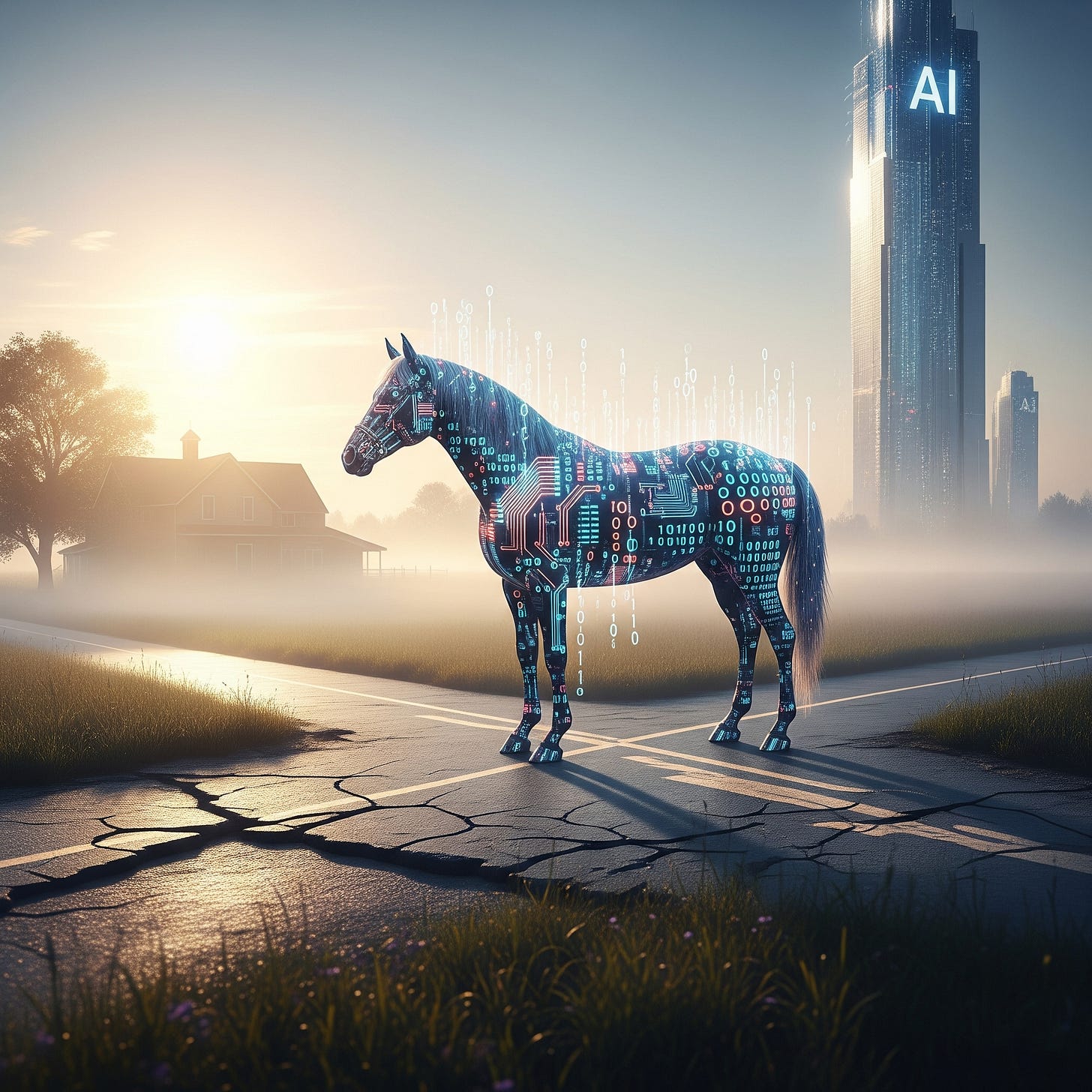One day, an old farmer's horse ran away. Upon hearing the news, his neighbors came to visit. "Such bad luck," they consoled.
"Perhaps," the farmer replied.
The next morning, the horse returned, bringing with it three other wild horses. "What great luck!" the neighbors exclaimed.
"Perhaps," replied the old man.
The following day, his son tried to ride one of the untamed horses, was thrown, and broke his leg. The neighbors again came to offer their sympathy on his misfortune. "Such bad luck."
"Perhaps," answered the farmer.
The day after, military officials came to the village to draft young men into the army. Seeing that the son's leg was broken, they passed him by. The neighbors congratulated the farmer on how well things turned out.
"Perhaps," said the farmer...
(Thank you Erik Qualman for the story in your book, The Focus Project)
In this unfolding narrative of artificial intelligence, we find ourselves, collectively, standing at the farmer's fence, observing the horse that has just arrived – AI. It’s a force that promises to and is reshaping our working lives, and just like the farmer’s ever-present "perhaps," the implications are far from clear-cut.
For some, AI is a harbinger of doom, a force poised to affect millions of jobs into obsolescence. They see a future where algorithms write, design, analyze, and even strategize, leaving humans with little left to do. The fear of widespread job displacement is palpable, the hype may be through the roof, a legitimate concern echoed by reports estimating significant portions of jobs being exposed to AI. Entry-level roles, traditionally stepping stones, are seen as particularly vulnerable, and white-collar professions may be the most affected.
Then there are the optimists, those who view AI as an unparalleled tool for human augmentation. They speak of a new era of productivity, creativity, and efficiency. AI, in this vision, doesn't replace us; it frees us from the mundane, allowing us to focus on the truly human aspects of work – critical thinking, empathy, innovation, and complex problem-solving. They point to the creation of entirely new job categories, the enhancement of existing roles, and the potential for a more fulfilling work-life balance as AI handles the heavy lifting. McKinsey suggests that while tasks will be automated, this could lead to more strategic and creative initiatives for human workers.
So, which perspective is correct? Is AI a blessing or a curse for the future of work? The farmer’s wisdom offers an answer we can embrace: "Perhaps." But, what we do with that answer, matters. Are we sitting still and watching AI go by or are we embracing it and finding where we fit in? What are you doing?
The truth, as always, is possibly nuanced and not like either extreme suggests. AI will automate tasks and augment the human. It already is. Repetitive, data-heavy, and predictable jobs may be tasked by intelligent systems. This isn't necessarily "bad luck." It's an opportunity. The loss of a laborious, unfulfilling task, if viewed through the right lens, can be the catalyst for growth, reinvention, and the pursuit of more meaningful endeavors.
But the "good luck" of new opportunities and enhanced productivity also comes with its own "perhaps." What if the transition is uneven? What if certain demographics or skill sets are disproportionately affected? What if the benefits accrue to a select few, exacerbating existing inequalities? These are the broken legs, the moments of misfortune, that we must acknowledge and prepare for. Ask yourself: what can we do here? Ask yourself how you can help?
The critical factor isn't whether AI will disrupt the job market – it is and will. The true determinant of our collective future will be what we do with it. Will we view job shifts as failures, or as invitations to reskill, upskill, and redefine our contributions? Will we invest in lifelong learning, embracing a mindset of continuous adaptation? Will governments, businesses, and individuals collaborate to create pathways for new roles, working for a better transition for those whose livelihoods are impacted?
The story of the farmer reminds us that events, in isolation, rarely dictate their ultimate meaning. It is the subsequent actions, the responses to the unforeseen, that truly shape our destiny. The rise of AI in the workplace is not merely a technological revolution; it is a profound societal shift that demands our thoughtful engagement.
Let us approach this age of AI with the farmer's quiet contemplation. Not with blind optimism, nor with paralyzing fear, but with a clear understanding that the path ahead is uncertain, full of both challenges and unprecedented opportunities. How we as individuals react to what’s happening can help determine our personal growth and augmentation with AI. Our resilience, our adaptability, and our willingness to define what truly matters in a world increasingly powered by intelligence will determine whether the arrival of AI is ultimately "good luck," "bad luck," or simply… "perhaps," and let us all help shape our own personal journey with AI.




